Charlie Chaplin: The Social Commentator
“I’m an individualist, I am an internationalist, a peace monger, and I use my status as a driving force against inequality” [1]. Charlie Chaplin’s impact upon cinema went beyond slapstick and hapless adventures as The Tramp. Chaplin was an immense auteur, whose later filmography always tackled social issues. These social issues were conveyed as a hindrance upon society, wherever it be harsh working conditions, Nazism or commercialism’s negativity. Chaplin exposed them and demanded others to see their unjustification. Chaplin tackling social issues showed himself to be a powerful social commentator. This was because for the time period, the social issues represented in Chaplin’s films were controversial or of a minority opinion. Chaplin was controversial in ridiculing a regime whilst it consolidated power across Europe. Chaplin challenged American industries’ working methods and stood up against political acts, which were accepted under the guise of patriotism.
Modern Times (1936): The Great Depression and Inequality
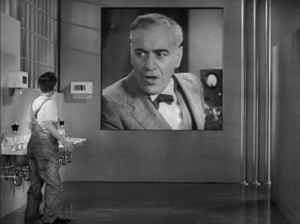
Modern Times opens with the message, ‘a story of industry, of individual enterprise, humanity crusading in the pursuit of happiness’. Modern Times stating humanities’ happiness lay within American industry and individual enterprise was revealing flaws within society, how American industry and individual enterprise enforced unfair working conditions. The factory workers were introduced through profound symbolism, using a shot of sheep being herded before fading into the factory workers entering their workplace. This was definitive in criticising the pursuit of happiness according to America’s industry and individual enterprise, revealing inhumane treatment of the factory workers. This inhumane treatment continued to be criticised upon close inspection of The Tramp, whose body constantly twitches as a result of overwork. When The Tramp takes a break, his Boss speaks from a screen in the toilets and demands The Tramp to get back to work. The Boss’ treatment of The Tramp underlined inequality as he constantly used screens to dictate his factory workers. The Boss’ behavior continued to be harsh in experimenting upon The Tramp through a feeding machine. “Don’t stop for lunch, be ahead of your competitor” says the feeding machine’s inventor, which delights the Boss as they experiment on The Tramp. Although the feeding machine scene is depicted as comical, there was an underlining seriousness as the feeding machine was an example of what Chaplin saw as American industry and individual enterprise crippling humanity.
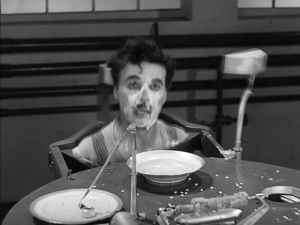
Modern Times’ sub-plot was a poor teenage girl’s struggle to provide for her family. Only referred to as the Gamin, she is introduced by stealing food for herself, her sisters and father. A close-up reveals the Gamin’s defiance in providing food for her family. It is clear the Gamin was to be sympathised with as her plight was caused by social inequality. This sympathy is built upon revealing the Gamin’s father is unemployed, a common problem for the masses during the Great Depression. The Gamin’s father is one of many who protested against the injustices brought by the Great Depression, only to be shot dead by the Police. His death separates the family, forcing the Gamin to run away and survive on her own. The family’s separation was portrayed as a tragic repercussion of the Great Depression’s demoralising affect upon society.
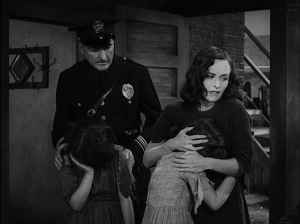
The Tramp and the Gamin soon unite by chance, equal in their plight which bonds them together. They wander the streets and come across a couple exiting their luxurious home. This transcends into a fantasy where The Tramp and the Gamin live together in comfortable surroundings. The fantasy ends when they consider the reality of their current situation. Later in Modern Times, The Tramp and the Gamin eventually build a shack which “of course it’s no Buckingham Palace”, but for them is good enough. These moments reflect The Tramp’s and the Gamin’s satisfaction for basic necessities during the Great Depression. They had to face inequality every day of their lives, so having basic necessities gave them happiness in contrast to the aims of American industry and individual enterprise.
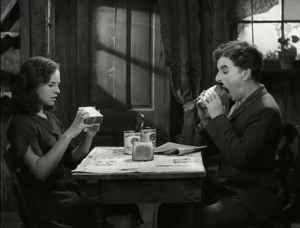
The Great Dictator (1940): The Horrors of Nazism
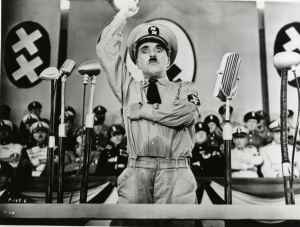
“Had I known of the actual horrors of the German concentration camps, I could not have made The Great Dictator. I could not have made fun of the homicidal insanity of the Nazis” [2]. This was Chaplin’s retrospective comment in the film where he satired Hitler’s eg0-centric, theatrical public persona and the Nazi party’s brutality upon Jewish people. Yet this should not diminish The Great Dictator as a profound statement against Nazism. Chaplin captured why Hitler was a horrific individual along with the brutality SS troops used in their treatment of Jewish people.
Chaplin personified Hitler’s madness through his portrayal as Adenoid Hynkel, mocking Hitler for his infamous use of theatrical mannerisms. When Hynkel delivers a speech, he hilariously exaggerated, shouting into the microphones to the point where they bend away from his voice as it becomes increasingly illogical. Hynkel is portrayed as an obscene fool rather than a great dictator. The obscenity continues when Hynkel and his associates undertake experiences such as bullet-proof clothing and parachute hats, which fail miserably. Yet The Great Dictator focused more upon Hynkel’s ego-centric personality, shown in his relationship with Benzino Napaloni, a satire of Benito Mussolini. They were constantly at odds with each other due to their equally huge egos, constantly trying to dominant the other. Their egos came to ahead over a proposed treaty, fighting each other with food as if they were bickering children. Chaplin wished to show such behavior as the dictators’ true personalities, who were destructive to themselves and tragically towards humanity as well. This was evident in the scene where Hynkel adores a globe in a perverse, possessive manner. Hynkel played with the globe delicately, yet Chaplin made clear Hynkel’s destructive ideals.
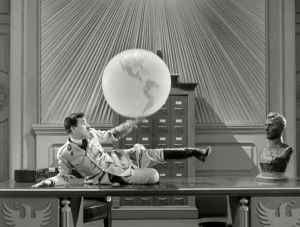
The Great Dictator also follows the residents of a Jewish ghetto as they struggle under Hynkel’s regime. The Stormtroopers, symbolic of the SS Guards, constantly bully and mistreat Jewish residents. However Hannah, one of the Jewish residents, attempts to stand up against the Stormtroopers. This results in Hannah being hit with tomatoes by the Stormtroopers, showing their horrific brutality. These were also the experiences of a character referred to as the Jewish Barber (also played by Chaplin). When the Jewish Barber returns to his shop, he is puzzled by the Stormtroopers painting ‘JEW’ on his windows. When the Jewish Barber confronts the Stormtroopers, it results in intense brutality where he is almost lynched. These brutal scenes reflected Chaplin’s horror at the Nazi’s ideology.
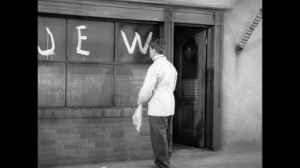
The Great Dictator played on Chaplin’s dual-roles by creating a scenario of mistaken identity, where the Jewish Barber is assumed to be Hynkel and rushed to a speech following the regime’s recent occupational triumph. This gives the Jewish Barber an opportunity to promote unity and end oppressive rule, instead of Hynkel’s hatred. “We want to live by each others’ happiness, not by each others’ misery”, the Jewish Barber stated. This was Chaplin’s definitive statement against Nazism, rejecting their racial superiority and instead wished to promote a united humanity.
A King in New York (1957): Critique of 1950s American Society
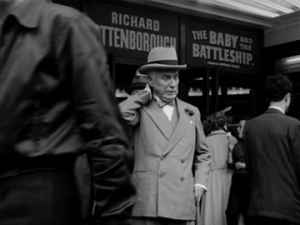
A King in New York shows King Shahdov in exile from Estrovia, a fictional European country, which Shahdov blames on his stance against atomic power. Shahdov’s views on atomic power reflect Chaplin’s opposition of America’s prominent advancement and experimentation of nuclear weapons during the 1950s, seeing it as an exercise in evil. Shahdov at first is seduced by American society, “the glamor of it all” as he says, which soon comes to ahead as Shahdov is bombarded by commercialism. Shahdov is manipulated into starring in a live television broadcast where Ann Kay, a TV Specialist, uses Shahdov’s publicity as an exiled King to promote her products. Shahdov is understandably confused by the process, “I find her very odd”, he tells a fellow dinner party member. Shahdov becoming a victim of manipulation for commercial gain on Ann’s part reflects Chaplin’s criticism of 1950s American society, when commercialism was becoming increasingly dominant through television advertisements and product placements.
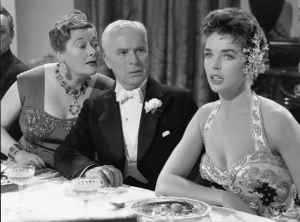
As Shahdov lost his money in exile, he is forced to take part in commercial projects. “It’s all bewildering, I don’t understand it at all” says Shahdov as he is forced to extreme lengths for money, including plastic surgery to make himself more presentable on television. A King in New York also criticised 1950s American society in its political hounding of Communists or those with left-wing ideals. Chaplin had been a victim of this political hounding as his American citizenship was revoked and ousted from a country where he had been beloved. This was represented through Shahbov’s acquaintance with Rupert, a young boy with radical ideals. Shahbov sees Rupert reading Karl Marx and asks Rupert if he is a Communist. “Do I have to be a Communist to read Karl Marx?” replies Rupert, to which Shahov responds is a valid point. This mirrored Chaplin’s own life, where he was accused of Communism simply because of his left-wing ideals. This scene was Chaplin criticising the political paranoia which had driven him out of America. Shahbov’s acquaintance with Rupert, whose parents are soon indited as Communists, leads to Shahov being accused of Communism. Shahov caught up in the political hysteria reflected Chaplin’s hatred for the deep-seated political conservatism which was dividing America.
Chaplin’s later filmography proved himself beyond his The Tramp persona, he could reflect upon social issues which were affecting humanity. Modern Times, The Great Dictator and A King in New York all enforced Chaplin’s aim to tackle inequality and be a peace monger for society. Chaplin felt the aims of industrial progress were motivated by greed, leaving humanity to be inflicted and inequality to increase. The horrifying surge of Nazism which engulfed most of Europe, whilst American cinema mostly stayed silent until Pearl Harbor, Chaplin was not afraid to cause controversy in satirising Hitler to promote peace for humanity. The escalating political turmoil and advances of commercialism were another set of disadvantages Chaplin saw as inflicting humanity. The manner in which Chaplin tackled social issues proves his self-reflection as a peace monger.
What do you think? Leave a comment.











Sometime before Modern Times appeared, Charlie Chaplin made this remark: “There are those who always attach social significance to my work. It has none. I leave such subjects to the lecture platform. To entertain is my first consideration.”
That was before Modern Times. Especially with The Great Dictator, he engaged social issues.
Although Chaplin claimed that “Modern Times” was not a piece of social commentary, the plot of the film suggests otherwise. Chaplin uses comedy to convey his point, effectively grasping the audience’s attention before stating his views. Many scenes of the film revolve around food and hunger, big issues during the Depression. All of the crimes committed, like Chaplin’s gluttony at the cafeteria, the gamin stealing the loaf of bread, and the thieves robbing the department store, are prompted by social circumstances caused by the hard times of the Depression. Chaplin is unable to find a job in the tough world of the Depression, and would rather go back to jail, where he led a more comfortable life. The thieves are driven to stealing because of their hunger; although the factory worker, one of the thieves, works incessantly, he is still not paid enough to survive. Because Chaplin addresses some of the social issues of the time, he cannot say that the film has no social significance. By including the issues in his film, he is forcing the public to recognize and think about the impact of those issues.
Chaplin may very well be using entertainment as a way to convey his message, because when you entertain the audience, it’s easier to get your point across since you have their full attention.
i know that it’s widely accepted that TGD was the only full length film made in
hollywood that dealt with the rise of national socialism (3 stooges also made a short). however i’ve often wondered, given the extent of hollywood’s involvement in propaganda, whether there were other, less “admirable” films made…as in, films which were pro-fascist or even films that treated the subject ambguously? even a film which doesn’t openly condemn fascism is unacceptable to the “script” of history, in the way that the idealogues wish to present america in the 30s and especially the reasons for USA entering the war(the “good guys”).
As far as I know, there were no American films before Pearl Habor conveying pro-Nazi/fascist propaganda. I am aware there was a Nazi organisation within America and prominent members of American society donated money to the Nazi party before Pearl Habor.
Germany had been a huge market for American films in the 1930s. Quite a few of the major movie moguls of the period were European born Jews: Louis B. Meyer (born Lazar Meir in the Ukraine), the Warner Brothers were from what is now Poland (Sam was born Schmuel Wonsal or Wonskolasar, Harry was born Hirsch Moses, Albert was born Abraham, and Jack was born Jacob in London, Ontario after the family had immigrated), Samuel Goldwyn was born Schmuel Gelbfisz in Warsaw, Poland, Adolph Zukor (Paramount) was born in Hungary, and Carl Laemmle (Universal) was born in Germany.
The major studios tended to ignore Hitler in order to maintain the German market until the US went into war. Jack Warner was opposed to Hitler largely because a studio salesman was beaten to death in Berlin by Nazis. Warner Brothers in 1939, released “Confessions of a Nazi Spy” (1939) starring Edward G. Robinson and received a lot of pressure for German and American politicians from making any more anti-Nazi films because we were still on ‘friendly’ terms with Germany. He was given the rank of Lt. Colonel in the US Army Air Force after the start of WWII.
Whether or not it was Chaplin’s full intention to make a social statement in his movies will always remain a mystery.
In Modern Times, Chaplin was trying to express his feelings about the impact of poverty and the industrial revolution on the Americans. Throughout the first half of the movie, Chaplin conveys the message that Americans are robots operating under a higher authority. For example, Chaplin’s first job at the steel factory was to screw the nuts on a plaque incessantly. This portrayal emphasizes the dull and menial lives of industrialists. Also, when Chaplin is in jail, the prisoners have to march in synchronized movesments–like robots. Maybe Chaplin was trying to show the negative impacts of the industrial revolution–Americans being stripped of their individuality and becoming part of the masses.
Charlie Chaplin claimed that his films contained no social commentary and were made purely for the entertainment of his audiences. At first most people would say that that is completely absurd and that his films don’t contain social commentary at all, and that it is foolish to overlook the commentary that Chaplin has very blatantly put into his movies. Modern Times is obviously a movie with a lot of social commentary directed at the hard life the people had to face during the depression. However, Chaplin himself says, “to entertain is my first consideration.” Although Chaplin included social commentary into his movies, we must keep in mind that he felt that it was most important to entertain his audiences. It would be unfair and inaccurate to say that Chaplin made his films solely to persuade his audiences with social propaganda. His views were in the movie, but we must remember that he was not a socialist leader, but rather an entertainer.
I’m reminded of the “notice” at the opening of The Great Dictator, in which viewers are advised that any similarity between the barber and “Adenoid Hynkel” is strictly coincidental, even though Chaplin clearly plays both parts.
Industrialism, if not capitalism, was turning people into machines, at the least in the factories. Chaplin knew enough to let people draw their own conclusions from their experiences or those of others.
I have yet to see Modern Times, but The Great Dictator is undoubtedly a work which seeks to speak out against intolerance and the horrors it can produce. What’s interesting to me is that Chaplin once said that if he had known the full extent of Nazi crimes, he would not have made the picture. One would think he’d have more reason to make the film in order to stand up against oppression, but I suppose Chaplin was as much an entertainer as a social commentator, and he knew full well people wouldn’t want to see a film that parodied the Third Reich after having learned how bad they truly were.
The great dictator gives you the impression that Chaplin was struggling hard to adapt to the era of sound! It has the feel of a silent movie right from the start and lacks the sophistication of a mature sound movie.
It was and is a very important film. People just didn’t make films with subject matters such as this, and thus is very much ahead of its time.
It is a brave film and was extremely controversial… extremely, mainly because in the speech he was addressing everyone- not only the Nazis- about racism, humanity, and freedom. An unheard of level of depth in this film for a time when movies were simply “entertainment” and acting was “just a job”.
I believe that with a film like MODERN TIMES, Chaplin was simply being influenced in his art by social forces the same way any artist was at the time
It is true that Chaplin was an entertainer before anything else, yet he has always symbolized more for the audience and played on that image of social revolt. For instance, he said himself he was determined to make people laugh at Hitler in TGD yet his last speech shows how serious he is as he takes on the role of a peacemaker, carrying a general message to the world. You can see it in the lighting, the way he is positioned behind the stage, the close-up, the camera angles, the way he speaks, the expression of his face and of course the words…it has been designed as a political speech meant to convince and be taken seriously. Even in his previous films, although he said himself he didn’t attach any social significance to his work, his comedy was based on social issues and he always contested authority and injustice. All his characters represented a caricature and he mocked them – for example, the policeman represented the useless authority. He depicted poverty and social isolation through his character of the tramp and with the sets, dirty London-like streets based on his childhood memories. In The Immigrant for instance, you can’t help but see the social commentary when the immigrants arrive in the ‘Country of Liberty’ and are instantly tied up behind a rope like prisoners and enter the country one by one. Even The Kid touches issues like parenting, abandoning a child, the injustice of him being taken away and that gender gap between a man parent and a woman parent. So it’s difficult not to see Chaplin as a social commentator because all his comedy is based on it, just as all his commentary is based on comedy. He proves to generations that you can be both at the same time, an entertainer and a social satirist.
Great Article. I never realized how much social commentary there was in Chaplin’s movies. This was a truly enlightening article.
I first saw some scenes of Modern Times in a world history class, and it was both entertaining and informative. As Rachel said above, Chaplin’s comedy and social commentary often seemed to go hand in hand, as satire. Great article!
This is a far cry from Chaplin’s Keystone Cops days.